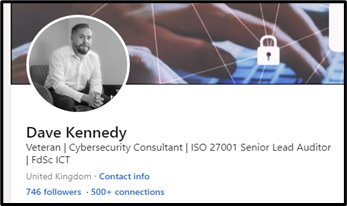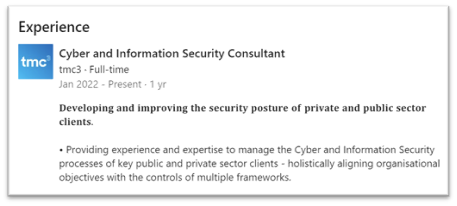The end? Or the Beginning? That’s up to you
It’s not been easy, trying to condense a years’ worth of resettlement experience into a few short blog entries, harder still when every experience is so personal. I’ve tried to focus on the areas I struggled with most to spare others from the same issues.
Whether that’s worked or not isn’t for me to say. But I hope so.
One thing I hope I’ve made clear is the importance of selling your personal brand, enabled, in no small part by your CV.
Don’t worry, I won’t go on about them again. I want to use this final entry to focus on something…more modern…
Social Media.
Love it or hate it, it’s here to stay!
I’ve deliberately stayed away from talking about it until now, for good reason; to avoid the misconception that a social media presence is ever “finished” – something to “get done” during resettlement, and then forgotten.
And let’s be clear, when I say “social media” in this context, I mean LinkedIn.
I’ve said before, there will be those who won’t recognise the professional world they left all those years ago. Nowadays, LinkedIn is used synonymously with business. “Digital” with “professional”. And used correctly, it’s a powerful tool.
So how do we use it effectively? What makes a good LinkedIn profile?
This is a deceptively complex question whose answer is entirely subjective. There are, however, some common “easy wins” to be found…
…and being veterans who love a directive, I find a structured top-down approach is the easiest way to communicate them!
Building the picture up – literally
I’m going to put this delicately…
…No one, particularly employers and recruiters, wants to see a LinkedIn profile picture of you holding a beer, bleary eyed, and slumped over your mate’s shoulder at a festival from 2014.
I’m sure it was a great day but save it for Facebook.
By the same logic, do they need to see you all smart in your Nos. 1’s, with a banner picture of HMS Floaty-Boat behind you? Probably not.
I’m not comparing the two, but the contrast is important. Yes, an employer knows you have a social life, and they know you are a veteran. They would encourage one and celebrate the other. But we don’t need to force it down their throats to make a point.
What they want to see is a smart, considered professional who can slip effortlessly in their organisation.
I accept that the definition of “smart” is subjective – and that’s fine – but take your time to get a well-presented profile picture that makes you look comfortable, professional…and approachable.
Get specific!
Consider the world today. How are people searching for you? For any talent? I'd bet you anything they’re on a phone, flicking through pages looking for something that catches their attention.
So, catch it.
The options to personalise your LinkedIn profile are almost boundless. You’ve got your name on there, so why not make a few impact statements underneath? Things you want an employer – or future employer - to know about you.
Look at mine.

I’m not putting this here to show off – but I’m proud of being a veteran. I worked hard to get my degree. My company paid a fortune for my ISO 27001 Lead Auditor certification. I want people to know about these things.
Why wouldn’t I? They’re relevant details.
I haven’t written a novel, just a few short highlights, introductions really. It’s the attention to detail I want you to notice. It’s not just a sentence, it’s a set of individual achievements (separated by a “pipe” symbol – Google it!) that collectively sell the whole.
LinkedIn it up…with your CV…
Despite my terrible pun, and my promise not to talk about CV’s again, there’s an important point to be made here.
The details you put on your CV – work history, education etc, MUST match the experience section of your LinkedIn profile. Remember, attention to detail is what separates you from the pack.
And while we’re on that, I want to get something important across…
I’m not going to get into the whole “translate your experience into civvy speak” thing again – I’ve laboured that point enough. What I would like to emphasise is the importance of online formatting.

There are those who believe they can’t use basic text editing to make parts of their feeds…pop…simply because LinkedIn won’t present the user with tools they recognise. You know what I mean, that little “B” at the top of your Word document that makes everything look like your shouting?
But with a bit of effort, you absolutely can, and should.
Notice the bold introduction to my current role, the bullet points? Looks clean and professional, doesn’t it? I must be a technical wizard.
True. So, buckle in, this next bit is going to get really complicated…
If you Google “LinkedIn Text Editor” you’ll find LOADS of sites that will turn your boring font into something…modern…which can be copied and pasted into your LinkedIn page. Here, I’ll save you the effort…use this one LinkedIn Text Editor – a Present from Dave.
That wasn’t technical at all. Sorry to disappoint!
The final bits before new beginnings
Getting a CV and a LinkedIn profile together is just the beginning, and they all share the same goal…to get you into a job when you leave the military.
So, what then?
Firstly, keep taking advantage of what’s available to you. It doesn’t suddenly dry up 6 months after you’ve handed your ID card in.
Schemes, courses, community groups – get involved. From ELCAS to veteran charities, there are ongoing opportunities, and dedicated companies offering everything from discounts to social events. And they want YOU to be involved.
I’ve said before that there’s a common misconception that veteran status ENTITLES us to the job of our dreams. It doesn’t. We must work as hard, if not harder, than our civvy counterparts. We’re starting again after all.
What we have, however, is our community behind us – and its priceless. Keep on it, even when you’ve landed that role.
Secondly, start accepting NOW that you’re going to miss the forces. Because you will. You’ll miss your mates, the uniform, medical care…something. You’ll adjust in time, but don’t fool yourself into believing the transition is easy.
Also try, if you can, not to be swallowed up by imposter syndrome. The skills you have are valuable – employers know that – the only person who can tell you otherwise, is yourself. A little bit of nerves keeps you sharp – but control them. They don’t own you.
Finally – enjoy yourself.
You’ve earned this stage. Sacrificed a lot. What comes next is up to you.
I left a year ago and haven’t looked back. It’s not always been easy, but the rewards have been worth it.
And I’m positive they will be for you.
Good Luck,
Dave.
Catch up with all blog entries in this series.
%20(1).png?width=290&name=Team%20(3)%20(1).png)


COMMENTS